- Home
- Jane Peart
Undaunted Spirit Page 3
Undaunted Spirit Read online
Page 3
“Well?” demanded Jamison.
“Well, it wasn’t exactly what I had in mind—” She hesitated. “Take it or leave it.” He shrugged and started to replace the pile of papers.
“No, wait, I’ll take it.”
With a great show of reluctance, Jamison stuffed the letters into a large manila envelope and handed it to her.
“Do three sample columns and bring ‘em in. Then we’ll see.”
At just that moment the newsroom door burst open and a skinny little boy ran in shouting, “Jury’s reached a verdict—the judge’s been sent for!”
There was an immediate scramble as reporters got to their feet, grabbed jackets and notebooks, and rushed out. One, who seemed to be taking his time, commented languidly, “No need to hurry. First, they’ll have to pry Judge Hurley out of the Pig ’n Whistle.” Mindy knew he was referring to a local tavern near the courthouse.
Mindy stood in the now emptied newsroom, clutching the envelope of letters. Inside it were pitiful tales of heartbreak, trials, troubles of all sorts, of which she herself was ignorant. Could she fill the gap left by a man of the cloth with years of dealing with such things? Whatever her misgivings, she knew this was her chance, her opening into a world she was eager to enter.
Chapter 4
Accident at the corner of Mason and Conway!” came the shout.
Mindy, at her desk, shoved into a cubbyhole of the newsroom, looked up from the pile of letters she was sorting through for the next day’s “Dixie Dillon” column.
Two reporters, who had been working at their desks, pushed back their chairs and hurried out. Mindy went back to working on her column, feeling a bit resentful. There was no reason why she couldn’t cover a story as well as any of the male reporters.
She had proved herself with the assignment Jamison had given her. They were getting more letters than ever for the column. Maybe she couldn’t quote Scripture as well as the Reverend Downing had, but she gave practical, down-to-earth advice that people seemed to welcome and appreciate.
Of course, it was all still her secret. She hadn’t told anyone but Farell that she was now “Dixie Dillon.” It was their private joke. She often shared some of the letters with him, asking for his viewpoint and believing that his masculine input gave the column a better balance. Since she only went in two days a week for a few hours, her parents thought she was doing clerical work for the newspaper.
At first she had avoided telling Judson the exact nature of her job. She told him she was answering letters to the paper. “You’re a secretary to the editor?”
“Not exactly,” she hedged. Then knowing it would have to come out sooner or later, she told him the truth. His reaction was exactly what she thought it would be.
“That’s the most ridiculous thing I ever heard of, and besides it’s dishonest. Those people really believe Dixie Dillon is a wise, old lady with all the answers. How can you pretend something like that?”
But whether Judson approved or not, Mindy was determined to keep the assignment in the hope that it would eventually lead to a real reporter’s job.
Sadly, Mindy had already decided that Judson had neither much imagination nor a sense of humor. To him things were clear cut, black or white. Still, he had other good qualities.
Resignedly, Mindy turned back to her work. She selected a letter and began to read:
Dear Dixie Dillon,
My sister is my problem. Every time my boyfriend comes to call, she comes wherever we are, in the parlor, on the porch, out in the side yard and plunks herself right there, won’t budge, until finally he gives up and leaves. How can I get her to understand we might want some privacy. (That is without her going running to Mama and telling tales?) Signed, Frustrated
Dear Frustrated,
Are you sure you want to be alone with your caller? You didn’t say whether your sister was younger or older than you. If she’s older, maybe your sister’s protecting you from unwanted advances or maybe she’s interested in your caller herself?
If she is younger, there may be ways to entice her to go somewhere else when your friend calls.
Mindy sighed and mentally tried a different approach. Then she put that letter aside. She decided it wouldn’t make a very interesting one on which to base her column anyway. She picked up the next one.
Dear Dixie Dillon:
My husband spends most of his pay on drink. Unless I meet him at the factory gate on Friday he goes to the saloon with his buddies, and the children and I go without food. We’re behind with the rent and coal bill.
This kind of letter came frequently and infuriated Mindy. These poor women probably had married with the idea they were going to be protected and provided for, and now they lived dismal lives. They awakened in her a real fear of ever being dependent on a man.
This attitude did not do much to help Judson Powell’s chances. The more he begged Mindy to accept his ring, the more she resisted. “You don’t have work at that grubby paper,” he would complain when she made the excuse that she had her column to write when he wanted to take her for a ride in his new buggy. He was as jealous of her job as he would be of another suitor. What Judson wanted to see in that newspaper was the announcement of their engagement!
“Give me six months, Judson. Then we’ll talk about marriage. I feel sure Mr. Jamison is going to give me the opportunity to report a real news story soon.”
Mindy wasn’t as sure of that as she pretended. In fact, her last discussion with her editor on just that point had been discouraging. She had been working at the newspaper for nearly three months. Being Dixie Dillon provided some outlet for her creative energy—but not enough. She longed to do some of the stories the men reporters were doing. She felt she could write just as well—even better than some of them. In her opinion, they often left out the very things that she felt were the most important, things that readers would be interested in knowing. Although they usually followed the reportorial credo of “what, where, when, who, how,” it seemed to Mindy that they often skipped the “who,” the human side. They could do a fine job recounting the facts of a trial, but what about the family of the convicted man? What about the wife and children of someone being sent off to prison? They had a story to tell too. But no one was telling it. In those reports of accidents, burglaries, decisions of the city council—there were always human beings behind the headlines, ordinary people caught in extraordinary circumstances. Mindy longed to delve into those stories.
However, when she approached Mr. Jamison begging for a chance to attend a trial, interview a relative, or report on an accident, his dismissing answer was always, “One of the men is covering that.”
“Why can’t I try a real news story?”
“You’re not a full-time reporter, for one thing.”
“Let me do one story, then see—”
“I’ve got plenty of reporters to cover everything that happens in Woodhaven. Stick to your Dixie Dillon column. You’re doing a great job there. Good stuff.”
“I can do as good a job as any reporter if I had a chance.”
He looked up at her, an annoyed frown on his face. “
I’m sure you could, but then I’d have to pay you a reporter’s wages.”
“Well, why not?”
“You’re a single young woman for one reason. Most of the reporters are supporting a family on their salaries.”
Mindy sighed and kept threading through her mail doggedly searching for one that would make a compelling story on which she could tag an eye-catching headline.
“McClaren!” a loud voice called, jolting Mindy out of her absorption. “You better come. Now!”
She looked up and saw Jeff Singleton, one of the reporters, his face ashen, eyes wide standing at the door of the newsroom, motioning to her wildly. Alarm streaked through her. She stumbled to her feet, scattering the papers and letters off her desk to the floor. Automatically she reached for her hat, jammed it on her head and hurried through the web of desks toward him. He gr
abbed her arm and pulled her along with him, down the steps of the newspaper building, out onto the street and along the sidewalk. Ahead of them a circle of people was gathered three deep. Mindy heard a police whistle and saw two uniformed officers trying to push back the crowd.
“Press!” shouted Jeff. “Let us through.”
The shrill jangle of an ambulance siren cut through the air, as Jeff shoved her forward and she elbowed her way through. A blur of faces turned toward her. Later she remember they were faces of people she knew and from their look of shocked recognition, who also knew her.
Outside, several men were attempting to lead two terrified horses, wild-eyed and snorting with fear, away from where the two vehicles had collided. One was a wagon loaded with haystacks; the other a light buggy. Reaching the edge of the crowd, Mindy stopped. A scream rose, then caught in her throat, and she clutched it with both hands.
The man lying on the road, blood streaming from a gash on his forehead, was her father, Jacob McClaren. He lay white and motionless, his usually immaculate white linen shirt stained crimson. As Mindy stood frozen, she heard someone say, “Here comes Dr. Semple, make way.” She couldn’t speak or move. All she could do was watch in helpless agony as the doctor bent over the prone body of her beloved father. Then, unbelieving, she heard him say, “It’s no use. He’s gone.”
The next few days Mindy moved in shadows. Her doting, adored father was dead. His death was so shockingly sudden. Nothing could have prepared her for it. It wasn’t as though he had been in failing health or enduring a long illness. Jacob McClaren was at the peak of his health, a young, hearty man in his early forties. What was hardest of all for Mindy to bear was that she had no chance to say good-bye. She couldn’t even remember anything much about their last morning together. At the breakfast table, her mind had been too preoccupied about the day ahead at the newspaper, so distracted she could not even recall what they had talked about. She deeply regretted how absentmindedly she had turned her cheek for his kiss as her father had left for the hardware store. Oh, if only she had a chance to relive that hour. She would have jumped up from the table, run to hug him at the front door before he went down the porch steps and climbed into his buggy. If somehow we realized any parting could be a last.
Dazed with grief, Mindy saw everything as through a veil of unreality. Neighbors came with covered dishes and pies, friends called, relatives arrived. The funeral, the flowers, the reception after the graveside ceremony—all passed before her as though in some kind of dream, a dream she didn’t want, from which she desperately wished she could awaken. Then came the aftermath, the chilling information that Jacob had left nothing for his widow. The McClaren Hardware Store had seemed prosperous enough. But the very qualities of Jacob’s that had been so highly eulogized at his burial service—his generosity and kindness—were now the stark realities of his family’s situation. There was no money.
Through her tears, Percy repeated over and over, “He was the most generous man I ever knew, so free-handed, he’d loan money to anyone who asked and never ask repayment. When I’d sometimes suggest that the recipient was unworthy, Jacob would just smile and say, ‘The Lord keeps the books. Not for us to judge, give with an open heart.’”
Now the day of reckoning had come. The three dollars a week Mindy earned at the newspaper could no longer be frittered away on bonnet ribbons or books; instead, it had to be turned over to her mother for groceries.
There was no one else on whom Percy could depend. After the funeral, Mindy’s brother Ephram returned to his army post in Florida. Tom and his wife, Emily, lived in the next town, where they were building a house on her family’s farm and expecting their first baby. Farell’s health continued to be poor, and because of it, he could not hold a job. So it was up to Mindy to be the breadwinner. She must make more money. Somehow, she decided, she must become a full-time reporter for the newspaper. The question was: How? No sooner had she determined to present her case with renewed insistence to Jamison than a new problem surfaced.
After their father’s death, Farell’s health began deteriorating even more rapidly. One terrible night Mindy and her mother kept vigil by Farell’s bedside, trying to ease his wracking cough. Dr. Semple was called. When he examined Farell, the doctor looked grave.
“I hate to tell you this Mrs. McClaren, but this young man has incipient tuberculosis. If you don’t get him to a milder climate, see that he has plenty of rest, nourishing food, fresh air . . .” He shook his head, “Unless he does, I can’t say that he even has a year to live.”
Stunned, Mindy and her mother were at a loss. Where could they send Farell? Fortunately, Dr. Semple, a longtime friend as well as their family physician, told Percy he had relatives in North Carolina in the mountain area noted for its climate’s restorative benefits for consumptives. He would make arrangements for Percy and Farell to go there at once. They could board with the Asbury family, who accommodated such patients. Without delay, this was arranged. Mindy was to stay in Woodhaven until Farell recovered sufficiently to return.
While they were gone, the McClaren’s family home was to be put up for sale, and Mindy was to stay with Aunt Jen. Since the arrangement was temporary, Mindy didn’t mind the fact that it was into her aunt’s sewing room she moved. Other decisions could be delayed. The money from the sale of the house would provide Percy with living expenses for quite a few years.
Mindy’s heart wrenched in parting from her loved ones. Since her father’s death, she had relied more and more on Farell. In spite of his frail health, he was strong in heart and spirit, with a deep religious faith that sustained her. Each tried to put on a brave face, but not knowing how long the separation would be made their parting harder.
Chapter 5
The day Mindy put her mother and Farell on the train for North Carolina she stood on the platform, looking after the train as it steamed down the tracks and finally disappeared. The image of her mother’s face, framed in her crêpedraped widow’s bonnet, made her heart ache, and the already weary expression on Farell’s pale face was etched in her memory. Mindy wondered whether she might not be seeing her adored brother for the last time.
Disconsolately, Mindy walked back to the office. On her desk awaited a pile of letters, which had arrived in the morning mail. The volume of mail for Dixie Dillon had grown with each succeeding week. Today, she did not feel her usual anticipation about opening them or the creative energy to answer them. She felt empty inside, with no answers for anyone—not even herself. She felt cut loose from her moorings. Everything she thought of as permanent was gone. Staying with Aunt Jen did not appeal to her even though she knew it was temporary. Until her mother and brother returned or, as everyone assumed—especially Judson—that when the proper period of mourning had been observed, she would get married.
Mindy still wanted to become a bona fide reporter before settling down to a life of “domestic bliss.” This remained a source of many arguments between Judson and her—arguments that were never settled. Mindy wished he understood her need. But maybe that was asking too much.
To distract herself, Mindy settled down to work. Halfheartedly, she pulled out the first letter from the stack and began to read it. Just then from down the street came the familiar shrill sound of the fire alarm whistle. A few minutes later the rattle and roar of the horse-drawn fire engine clattered past the newspaper office. Mindy looked up as a couple of the reporters rushed out to follow the fire engine to the scene.
Mindy sighed and went doggedly back to work. She would have liked to be sent out on an assignment with some excitement, some drama, some human interest. But of course, covering fires was not considered her “beat.” She was relegated to the Women’s Page, articles covering the activities of the Garden Club, recipes from church suppers and social events of various kinds—things in which she herself had no interest. Not only did she detest attending such events, she liked writing about them even less. How could she convince Mr. Jamison that she was capable of serious repor
ting?
Forty-five minutes later, the two reporters returned, and Mindy overheard some of the details of the fire. A boarding house had been razed. A grease spill on the stove ignited it, and soon the whole building had gone up in flames like a tinderbox. Flimsy construction, no fire escapes, no kitchen pump from which water could have been drawn to put it out right away. “The whole place was a disaster waiting to happen,” remarked one of the men as he took off his coat and sat down at his desk to write his report.
As the two reporters discussed the fire, Mindy could not help but overhear. The boarders, they said, were mostly girls from the local shoe factory. Mindy had received letters from some of these workers, for they would often pour out their hearts to Dixie Dillon about their troubles: boyfriends, family quarrels, squabbles with a co-worker, working conditions. Their lives seemed drab enough without suffering a loss like this.
What struck Mindy was that the two men didn’t mention the girls themselves, who were at work when it happened but were now without a place to live. Hadn’t anyone interviewed them? Who told them their living quarters had been destroyed? The factory managers? Or had they just let them go on working while the fire consumed all their belongings? Did their employers just let them find out when the whistle blew at the end of the workday? The heartlessness of the situation touched Mindy’s tender heart. Where would they go to find a place to live or even spend this night? Did anyone know? Did anyone care?
Mindy had a hard time sleeping that night. Not only did she miss her mother and Farell, but she couldn’t get those homeless factory girls off her mind. How could she help? A few days later, in her mail, Mindy found out. A letter gave her the clue . It was from a girl named Aggie Sloane, a factory worker, left homeless by the boarding house fire. Written on rough, lined paper in a poor childish handwriting, it came straight from the heart.

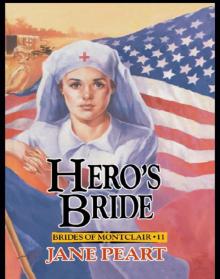 Hero's Bride
Hero's Bride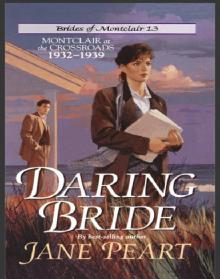 Daring Bride
Daring Bride Runaway Heart
Runaway Heart Promise of the Valley
Promise of the Valley Gallant Bride
Gallant Bride The Pledge, Value
The Pledge, Value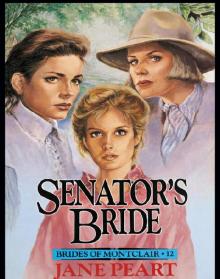 Senator's Bride
Senator's Bride Valiant Bride
Valiant Bride Shadow Bride
Shadow Bride Destiny's Bride
Destiny's Bride A Tangled Web
A Tangled Web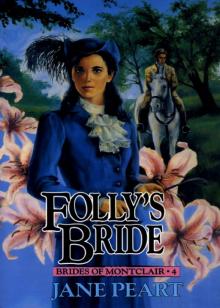 Folly's Bride
Folly's Bride The Promise
The Promise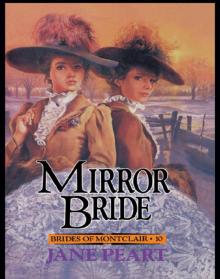 Mirror Bride
Mirror Bride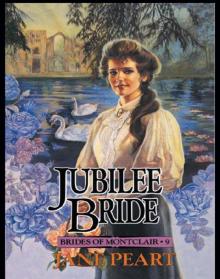 Jubilee Bride
Jubilee Bride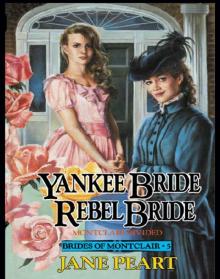 Yankee Bride / Rebel Bride
Yankee Bride / Rebel Bride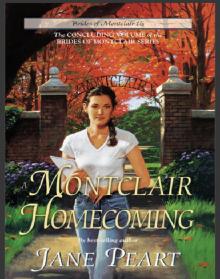 A Montclair Homecoming
A Montclair Homecoming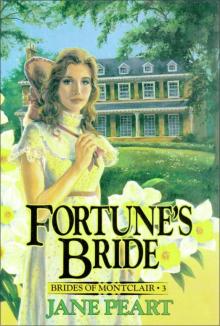 Fortune's Bride
Fortune's Bride Undaunted Spirit
Undaunted Spirit Love Takes Flight
Love Takes Flight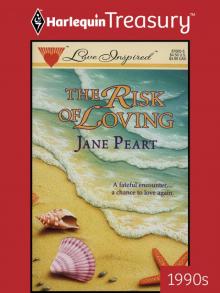 The Risk of Loving
The Risk of Loving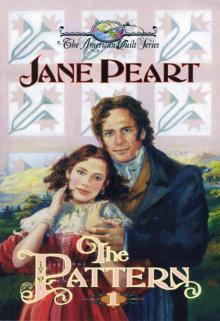 The Pattern
The Pattern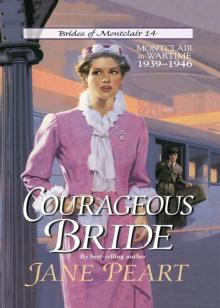 Courageous Bride
Courageous Bride